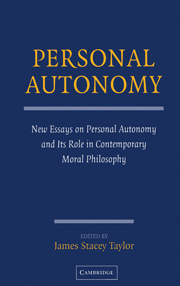Book contents
- Frontmatter
- Contents
- List of Contributors
- Acknowledgments
- Introduction
- PART I THEORETICAL APPROACHES TO PERSONAL AUTONOMY
- 1 Planning Agency, Autonomous Agency
- 2 Autonomy without Free Will
- 3 Autonomy and the Paradox of Self-Creation: Infinite Regresses, Finite Selves, and the Limits of Authenticity
- 4 Agnostic Autonomism Revisited
- 5 Feminist Intuitions and the Normative Substance of Autonomy
- 6 Autonomy and Personal Integration
- 7 Responsibility, Applied Ethics, and Complex Autonomy Theories
- PART II AUTONOMY, FREEDOM, AND MORAL RESPONSIBILITY
- PART III THE EXPANDING ROLE OF PERSONAL AUTONOMY
- Index
7 - Responsibility, Applied Ethics, and Complex Autonomy Theories
Published online by Cambridge University Press: 03 December 2009
- Frontmatter
- Contents
- List of Contributors
- Acknowledgments
- Introduction
- PART I THEORETICAL APPROACHES TO PERSONAL AUTONOMY
- 1 Planning Agency, Autonomous Agency
- 2 Autonomy without Free Will
- 3 Autonomy and the Paradox of Self-Creation: Infinite Regresses, Finite Selves, and the Limits of Authenticity
- 4 Agnostic Autonomism Revisited
- 5 Feminist Intuitions and the Normative Substance of Autonomy
- 6 Autonomy and Personal Integration
- 7 Responsibility, Applied Ethics, and Complex Autonomy Theories
- PART II AUTONOMY, FREEDOM, AND MORAL RESPONSIBILITY
- PART III THE EXPANDING ROLE OF PERSONAL AUTONOMY
- Index
Summary
When I was kindly invited to contribute a chapter to this volume, the letter of invitation included the following sentence:
As you know, the twin concepts of autonomy and identification have become increasingly important within contemporary philosophy, especially in discussions of moral responsibility and applied ethics.
Now, without wanting to seem ungrateful, I have to admit that I am not convinced that I do know this. Some things worthy of the name “autonomy” are clearly important in these domains; that much is clear. But when it comes to what philosophers in the Frankfurt-inspired moral psychological tradition have been working on, it is far from clear that the “twin concepts” of autonomy and identification have any relevance to either moral responsibility or applied ethics. I do not say that they have no relevance. Arguing for this strong thesis is not my intent. Instead, I will argue in this chapter for the somewhat weaker thesis that there is no trivial, or even obvious, argument for their relevance. The sentiment expressed in my letter of invitation is a prevalent one, but one that I think needs to be challenged. Although some broadly Frankfurtian theories of autonomy and identification may have major implications for moral responsibility and applied ethics, one cannot – perhaps, can no longer – assume uncritically that they do; and even in cases in which it is plausible to think there would be significant implications, it is often not clear exactly what these implications are. In arguing for this conclusion, I will focus on moral responsibility first and then say something about applied ethics afterward.
- Type
- Chapter
- Information
- Personal AutonomyNew Essays on Personal Autonomy and its Role in Contemporary Moral Philosophy, pp. 162 - 180Publisher: Cambridge University PressPrint publication year: 2005
- 5
- Cited by



